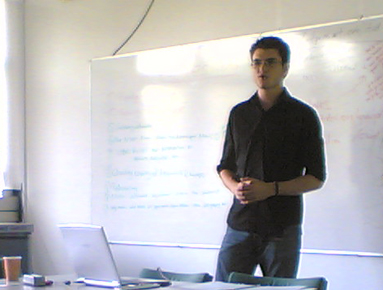This is the Annual ICT4D Postgraduate Symposium eight and last session briefing. It took place in Egham, September 15th, 2006, evening. Here come the notes I took on the fly:
David Hollow, Royal Holloway University of London
The challenges in providing effective primary education in Zambia through Interactive Radio Instruction
Interactive Radio Instruction differs from traditional distance education — the primary goal is the improvement of educational quality. It is, indeed, a more constructivist model.
Learning at the Taonga Market (LTM) started by Ministry of Education of Zambia, consisting of 30 minute broadcasts.
The Freeplay Foundation designed the Lifeline Radio for the humanitarian sector, a radio that works with solar energy or can be powered manually through a lever.
Challenges:
- Providing financial suport por mentors
- Ensuring quality of mentors
- Using locally appropriate language and content
- The decentralised system of education
- Consistency and commitment of the Ministry of Education
- Availability of funds
- Differing ideologies

David Hollow
Salma Abbasi, Royal Holloway University of London
Practical ways to deploy and sustain ICT to enable development and gender empowerment. Preliminary field observations of ICTs.
Gives some examples of “Kachi Abadi” in Pakistan and their PCOs (Personal Call Offices).
Problem statement: “Technology is not for girls”.
She’s developed a handbook of the different models of telecenters (e-Choupal, Akshaya e-Kendras, e Seva, Cabinas Públicas, Telecottages, Gaseleka Telecenter, etc.) and she’s listed the services offered in each type of telecenter (Agriculture community access, training center, information kiosk, e-transaction, e-governance cell, etc.)
Having this categorization in mind, what happens with Women and ICT Centers? What’s the impact on women:
- women empowerment
- income generation
- social respect for women
- skills development [she especially stresses this point]
- awareness [of the power of ICTs] building
An urgent need to have:
- integrated policies
- multi-stake holder environment
- localization of ICTs for the environment and culture
- use existing infrastructure
Marcus Duveskog, University of Joensuu
Cultural Encounters in Teacher Training Programmes in Tanzania
Dealing how to use technologyh to improve ICT education and HIV/AIDS education/counseling in Tanzania and soon also in South Africa. Challenge: How can we contextualize ICT education and technology so the local community can fully take advantage of its opportunities and possibilities.
Main problems:
- people not being “on the wave” of new technologies (“too old to learn”, “don’t need no training at my age”)
- not being motivated for learning (but payed to, so they could make their living while attending classes)
- legitimacy of the trainer and him knowing cultural proceedings
- legitimacy of the computer itself (“computer = Mzungu [white man]”): technology might not be at all a neutral platform
- Cultural traditions, customs
- Drought and electricity problems
- Corruption
First Annual ICT4D Postgraduate Symposium (2006)
If you need to cite this article in a formal way (i.e. for bibliographical purposes) I dare suggest:
Peña-López, I. (2006) “Annual ICT4D Postgraduate Symposium (session 8)” In ICTlogy,
#36, September 2006. Barcelona: ICTlogy.
Retrieved month dd, yyyy from
https://ictlogy.net/review/?p=439
Previous post: Annual ICT4D Postgraduate Symposium (session 7)
Next post: Annual ICT4D Postgraduate Symposium (closing plenary)
 RSS feed for comments on this post.
TrackBack URI
RSS feed for comments on this post.
TrackBack URI

